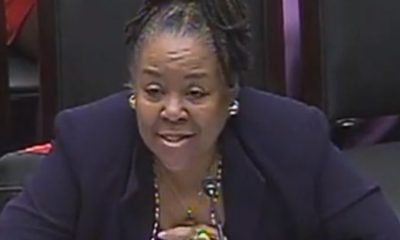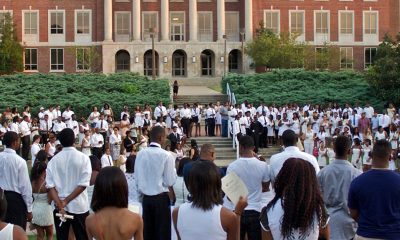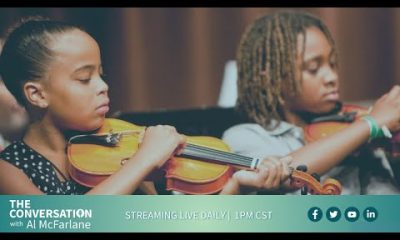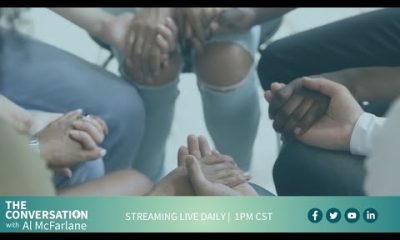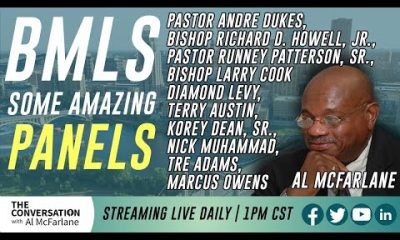Commentary
COMMENTARY: Women Making History
THE AFRO — For the first 144 years of our nation’s existence, the words, “all men are created equal” did not include the women of our country. Except in a few of the newer states west of the Mississippi River, women were denied the right to vote.
It is worth reflecting upon this harsh truth. For more than three-fifths of our nation’s existence, democracy did not exist for most of the women of our country.
As a people, we quite properly celebrate our past, the anniversaries of those moments in our history when Americans of conscience moved us closer to fulfilling our national ideals. In May and June of this year, our nation marks the Centennial of one of our most important and historic triumphs.
Expiating America’s Other Original Sin
For the first 144 years of our nation’s existence, the words, “all men are created equal” did not include the women of our country. Except in a few of the newer states west of the Mississippi River, women were denied the right to vote.
It is worth reflecting upon this harsh truth. For more than three-fifths of our nation’s existence, democracy did not exist for most of the women of our country.
Then, in 1919, after more than seven decades of struggle, the men then serving in our Congress finally voted to propose to the states for their ratification of the 19th Amendment to our Constitution guaranteeing women’s suffrage.
Recalling the struggle to achieve what UCLA Professor Ellen Carol DuBois has termed “the single greatest act of enfranchisement in American history” would be important at any time. It is especially relevant to our own time, however, when the voting rights of millions of Americans are under attack.
American men in 1919 and 1920 may have voted for women’s suffrage, but they did not “give” women the vote. Women (and men) fought for this most fundamental of our democratic rights, overcame difficult political obstacles, and won it.
Lessons For Our Time
As Professor DuBois reminded us in her recent Washington Post article, despite repeated setbacks, the Suffragists persisted — and, ultimately, their vision and determination prevailed.
Professor DuBois also articulates an even more compelling insight for our own time: the essential, but difficult, process of building and maintaining our progressive coalition in a national politics still dominated by issues of race.
As the University of Maryland’s Professor Sharon Harley elaborates in her excellent article for the U.S. Park Service, African American Women and the Nineteenth Amendment, the relationships among Caucasian and African American Suffragists were complex and often strained.
[https://www.nps.gov/articles/african-american-women-and-the-nineteenth-amendment.htm].
Prior to the Civil War, the abolition and women’s rights movements were intertwined and mutually supportive. Free abolitionist Black women like Sojourner Truth, Harriet Tubman, Maria W. Stewart, Henrietta Purvis, Harriet Forten Purvis, Sarah Remond, Mary Ann Shadd Cary and others were also prominent in the struggle for women’s rights.
As Professor Harley quite accurately informs us, however, after the Civil War, the movement for women’s suffrage became entwined with the national debates about the rights of former slaves and the meaning of citizenship.
With the proposal of the Fifteenth Amendment, which would enfranchise Black men but not women, these interracial, progressive coalitions began to seriously fragment.
Suffragists like Elizabeth Cady Stanton and Susan B. Anthony deserve our nation’s respect for devoting their adult lives to extending the franchise.
A less comfortable historical truth, as Professor Harley and others have reminded us, is that Ms. Stanton, Ms. Anthony and other Caucasian Suffragists all too often threw their Black sisters and brothers under the political bus in their efforts to gain political support for women’s suffrage in the South.
Moreover, as the national debate about women’s suffrage came to a head, the impact of the “women’s vote” on Black political power became an important point of contention on both sides of the struggle for women’s suffrage.
This is why the vision, courage, fortitude and determination of Black Suffragists like Ms. Ida B. Wells, Ms. Mary Church Terrell, Ms. Augusta T. Chissell of Maryland, and so many others deserve our acknowledgement and commendation today as we celebrate one of the most transformative democratic victories of our past.
Often disparaged and discounted, these strong Black women of conscience continued to fight against the twin evils of legally enshrined racism and sexism. Largely through their efforts, the national political coalition advancing universal citizenship survived, and a more inclusive democracy prevailed.
The Struggle for Full Equality Continues
Even as we celebrate the Centennial of the 19th Amendment during the coming year, the work to perfect our Democracy continues. Like the Suffragists of our past, the women of our time are demanding equality, justice and opportunity for everyone, not just for themselves.
As the Chair of the National Democratic Party’s Platform Drafting Committee in 2016, I can attest that we Democrats are clear about where our progressive coalition must stand. Here, from our Platform, is our pledge to the American People, women and men alike:
“We are committed to ensuring full equality for women. Democrats will fight to end gender discrimination in the areas of education, employment, health care, or any other sphere. We will combat biases across economic, political, and social life that hold women back and limit their opportunities and also tackle specific challenges facing women of color. After 240 years, we will finally enshrine the rights of women in the Constitution by passing the Equal Rights Amendment. And we will urge U.S. ratification of the Convention on the Elimination of All Forms of Discrimination Against Women.”
Our Democratic Party, not always a strong supporter of women’s equality in the 19th and early 20th Centuries, has become a committed advocate for gender equality today.
This is what the advocacy of a strong, united, progressive coalition can achieve.
I believe that the Suffragists of America’s past, Black and White alike, would approve.
Congressman Elijah Cummings represents Maryland’s 7th Congressional District in the United States House of Representatives.
The opinions on this page are those of the writers and not necessarily those of the AFRO.
Send letters to The Afro-American • 1531 S. Edgewood St. Baltimore, MD 21227 or fax to 1-877-570-9297 or e-mail to editor@afro.com.
This article originally appeared in The Afro.
Activism
Oakland Post: Week of April 24 – 30, 2024
The printed Weekly Edition of the Oakland Post: Week of April 24 – 30, 2024

To enlarge your view of this issue, use the slider, magnifying glass icon or full page icon in the lower right corner of the browser window. ![]()
Activism
Oakland Post: Week of April 17 – 23, 2024
The printed Weekly Edition of the Oakland Post: Week of April 17 – 23, 2024

To enlarge your view of this issue, use the slider, magnifying glass icon or full page icon in the lower right corner of the browser window. ![]()
Commentary
Opinion: Surviving the Earthquake, an Eclipse and “Emil Amok.”
Last Friday, a 4.8 magnitude earthquake shook New York City, reported as the “biggest earthquake with an epicenter in the NYC area since 1884” when a 5.2 quake hit. A bit bigger. The last quake similar to Friday’s was a 4.9 in 1783.Alexander Hamilton felt it — 241 years ago. That’s why New Yorkers were freaking out on Friday. They were in the room where it happens.
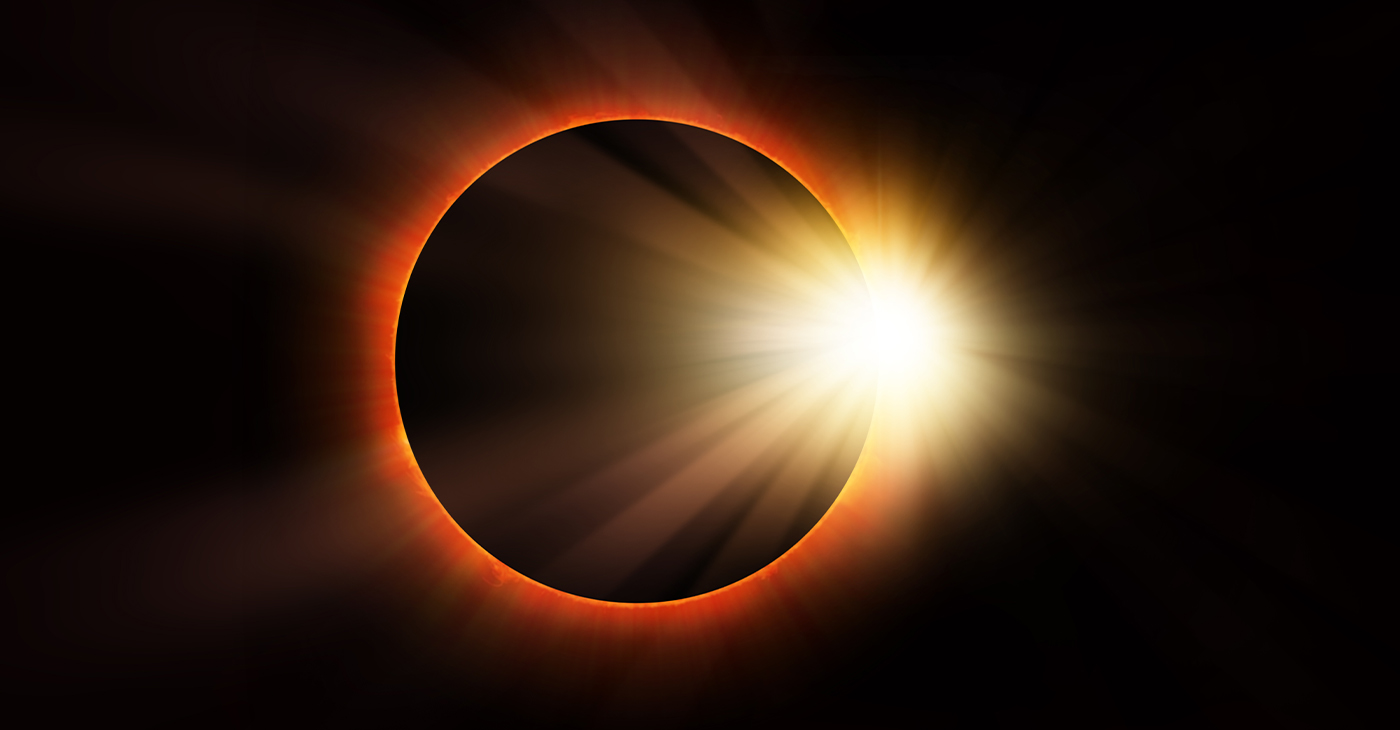
By Emil Guillermo
I’m a Northern Californian in New York City for the next few weeks, doing my one-man show, “Emil Amok, Lost NPR Host, Wiley Filipino, Vegan Transdad.”
I must like performing in the wake of Mother Nature.
Last Friday, a 4.8 magnitude earthquake shook New York City, reported as the “biggest earthquake with an epicenter in the NYC area since 1884” when a 5.2 quake hit. A bit bigger. The last quake similar to Friday’s was a 4.9 in 1783.
Alexander Hamilton felt it — 241 years ago.
That’s why New Yorkers were freaking out on Friday. They were in the room where it happens.
And it just doesn’t happen that often.
Beyonce singing country music happens more frequently.
When I felt New York shake last week, it reminded me of a time in a San Francisco TV newsroom when editors fretted about a lack of news an hour before showtime.
Then the office carpeting moved for a good ten seconds, and the news gods gave us our lead story.
On Friday when it happened in NYC, I noticed the lines in the carpeting in my room wiggling. But I thought it was from a raucous hotel worker vacuuming nearby.
I didn’t even think earthquake. In New York?
I just went about my business as if nothing had happened. After living near fault lines all my life, I was taking things for granted.
Considering the age of structures in New York, I should have been even more concerned about falling objects inside (shelves, stuff on walls) and outside buildings (signs, scaffolding), fire hazards from possible gas leaks, and then I should have looked for others on my floor and in the hotel lobby to confirm or aid or tell stories.
Of course, as a Californian who has lived through and covered quakes in the 4 to 6 magnitude range, I tried to calm down any traumatized New Yorker I encountered by taking full responsibility for bringing in the quake from the Bay Area.
I reassured them things would be all right, and then let them know that 4.8s are nothing.
And then I invited them to my consoling post-Earthquake performance of “Emil Amok, Lost NPR Host…”
It was the night of the eclipse.
ECLIPSING THE ECLIPSE
In New York City, the eclipse was about 90 percent visible. Good enough for me. Though a full solar eclipse is a celestial rarity, blockages of any sort aren’t generally celebrated. My one-man play is about growing up with the eclipsed history of American Filipinos and how I struggle to unblock all that.
For example, did you know the first Filipinos actually arrived to what is now California in 1587? That’s 33 years before the Pilgrims arrived in America on the other coast, but few know the Filipino history which has been totally eclipsed.
I was in Battery Park sitting on a bench and there was a sense of community as people all came to look up. A young woman sitting next to me had a filter for a cell phone camera. We began talking and she let me use it. That filter enabled me to take a picture of the main event with my iPhone.
For helping me see, I invited her and her boyfriend to come see my show.
Coincidentally, she was from Plymouth, Massachusetts, near the rock that says the year the Pilgrims landed in 1620.
In my show she learned the truth. The Pilgrims were second.
History unblocked. But it took a solar eclipse.
Next one in 2044? We have a lot more unblocking to do.
If you’re in New York come see my show, Sat. April 13th, 5:20 pm Eastern; Fri. April 19, 8:10 pm Eastern; and Sun. April 21st 5:20 pm Eastern.
You can also livestream the show. Get tickets at www.amok.com/tickets
About the Author
Emil Guillermo is a journalist and commentator. He does a mini-talk show on YouTube.com/@emilamok1. He wishes all his readers a Happy Easter!
-

 Activism4 weeks ago
Activism4 weeks agoOakland Post: Week of March 27 – April 2, 2024
-

 Community2 weeks ago
Community2 weeks agoFinancial Assistance Bill for Descendants of Enslaved Persons to Help Them Purchase, Own, or Maintain a Home
-

 Activism3 weeks ago
Activism3 weeks agoOakland Post: Week of April 3 – 6, 2024
-

 Business2 weeks ago
Business2 weeks agoV.P. Kamala Harris: Americans With Criminal Records Will Soon Be Eligible for SBA Loans
-

 Activism2 weeks ago
Activism2 weeks agoOakland Post: Week of April 10 – 16, 2024
-

 Community2 weeks ago
Community2 weeks agoAG Bonta Says Oakland School Leaders Should Comply with State Laws to Avoid ‘Disparate Harm’ When Closing or Merging Schools
-

 Community1 week ago
Community1 week agoOakland WNBA Player to be Inducted Into Hall of Fame
-

 City Government2 weeks ago
City Government2 weeks agoLAO Releases Report on Racial and Ethnic Disparities in California Child Welfare System



